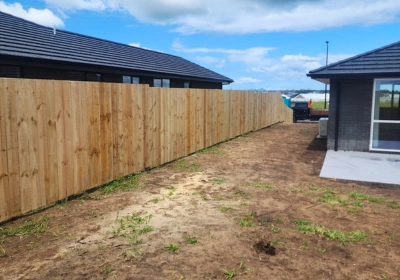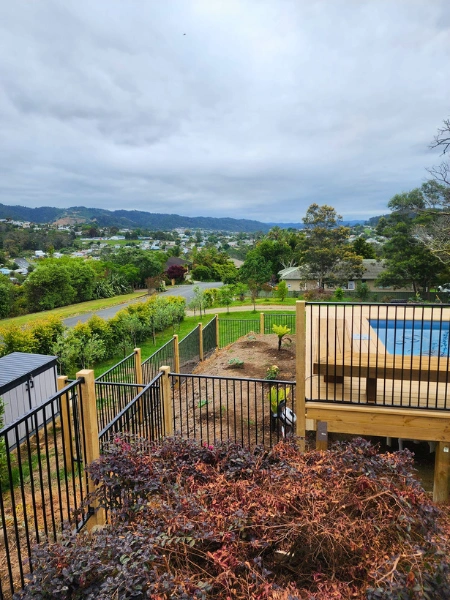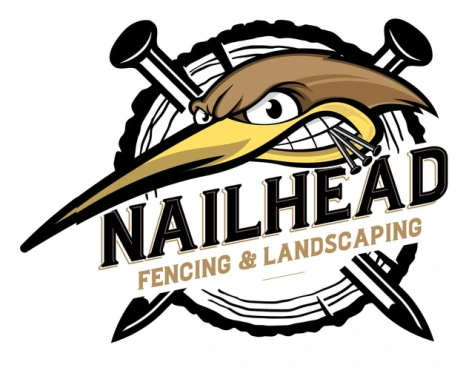Whangarei Fencing Regulations: What You Need to Know Before Installing
Blog // Whangarei Fencing Regulations...
Before starting any fence project in Whangarei, it's crucial to understand the local regulations and requirements. Installing a fence might seem simple, but failing to comply with the rules could result in penalties, costly changes, or even having to remove your fence entirely. Here’s everything you need to know about Whangarei fencing regulations to ensure your project goes smoothly.
1. Building Consent Requirements
A classic, versatile option for Whangarei homes
In Whangarei, building consent is generally not required for fences or hoardings up to 2.5 metres in height. However, there are a few important exceptions to be aware of:
Swimming Pool Fencing: Fences designed to restrict access to a residential pool must always comply with pool fencing regulations and require consent.
Fences Over 2.5 Metres: Any fence exceeding 2.5 metres in height requires a building consent.
The height of the fence is measured from the supporting ground directly below to the top of the fence. It’s crucial to stick within this limit unless you’ve obtained the necessary approval.

2. District Plan and Resource Consent
While building consent may not be needed for fences under 2.5 metres, your fence may still require a resource consent under the Whangarei District Plan. This can apply in cases where the fence height or its location impacts things like traffic visibility, neighboring properties, or aesthetic concerns. It's essential to check with the local council to see if your project falls under these regulations.
For example, fences along a shared boundary with a neighboring property may also need approval or agreement from your neighbor. Open communication is key to avoid future disputes.

3. The Fencing Act 1978
The Fencing Act 1978 governs shared boundary fences. If your fence is on a shared boundary, both you and your neighbor are responsible for the costs, but you must reach an agreement before any work begins. The act outlines how neighbors should cooperate on fencing decisions, ensuring fairness.
Make sure to have a discussion with your neighbor and agree on the style, height, and cost-sharing for the fence. A written agreement is highly recommended to avoid misunderstandings later on.
4. What You Can Build Without Consent
Here are a few examples of what you can build without a building consent in Whangarei:
• A 2.0 metre high concrete block wall along a boundary for privacy.
• A 2.2 metre high timber fence as a windbreak in your backyard.
• A 2.4 metre high hoarding around a construction site to ensure public safety.
As long as the fence does not exceed 2.5 metres in height and complies with other regulations (such as the Fencing Act and District Plan), you can proceed without the need for a building consent.
5. What Needs Consent
Some common fencing examples that require consent include:
• Fences up to 2.5 metres high do not need building consent (except pool fences).
• Always check the Whangarei District Plan for additional requirements or resource consent needs.
• Consult with your neighbor if you’re building a shared boundary fence.
• Ensure your fence complies with the Building Code even if consent is not required.
6. Key Takeaways for Your Whangarei Fence Project
• A 3.5 metre high wire mesh fence around a tennis court.
• A 3 metre high timber fence along a rear boundary.
• A 1.2 metre high fence around a swimming pool, which must comply with pool fencing regulations and is subject to regular inspections.
By following these guidelines and checking with your local council before starting your project, you can ensure that your fence is built legally and hassle-free.
Need Expert Help with Fencing?
If you’re unsure about regulations or need help with your fencing project in Whangarei, Nailhead Fencing & Landscaping is here to guide you. We specialize in compliant, high-quality fencing solutions. Contact us today!
All Rights Reserved. © 2024 | Nailhead Fencing and Landscaping
All Rights Reserved. © 2024 |
Nailhead Fencing and Landscaping


